Unit 5 What are the shirts made of-Section A Grammar Focus-4c课件(共61张PPT)
文档属性
| 名称 | Unit 5 What are the shirts made of-Section A Grammar Focus-4c课件(共61张PPT) | 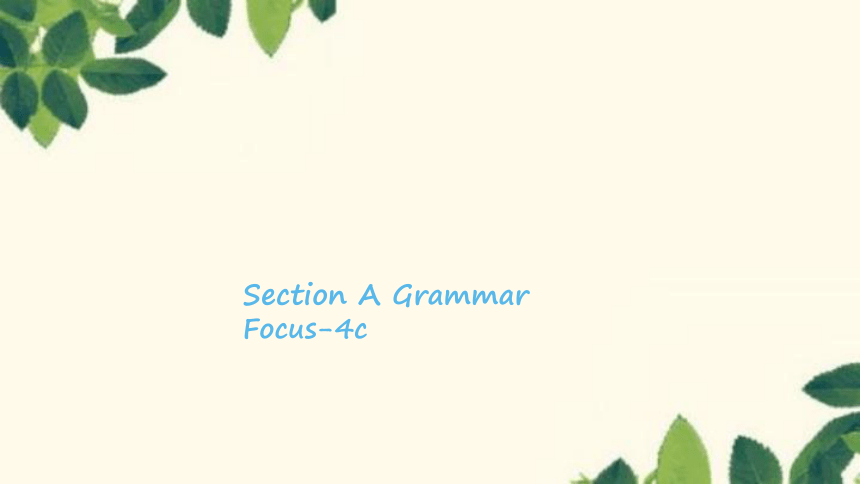 | |
| 格式 | ppt | ||
| 文件大小 | 2.1MB | ||
| 资源类型 | 教案 | ||
| 版本资源 | 人教新目标(Go for it)版 | ||
| 科目 | 英语 | ||
| 更新时间 | 2022-09-15 20:07:19 | ||
图片预览

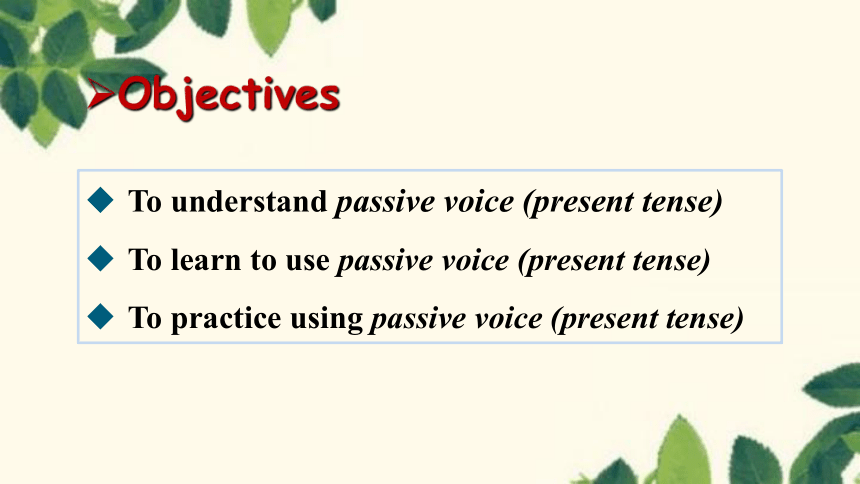
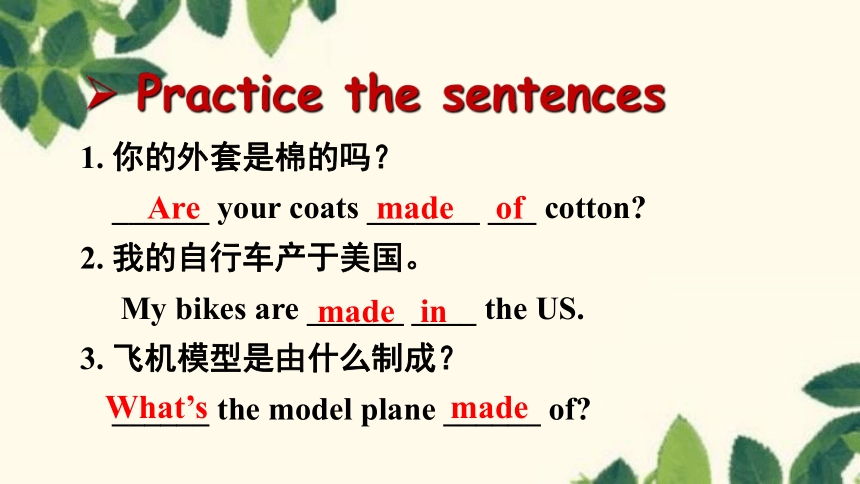
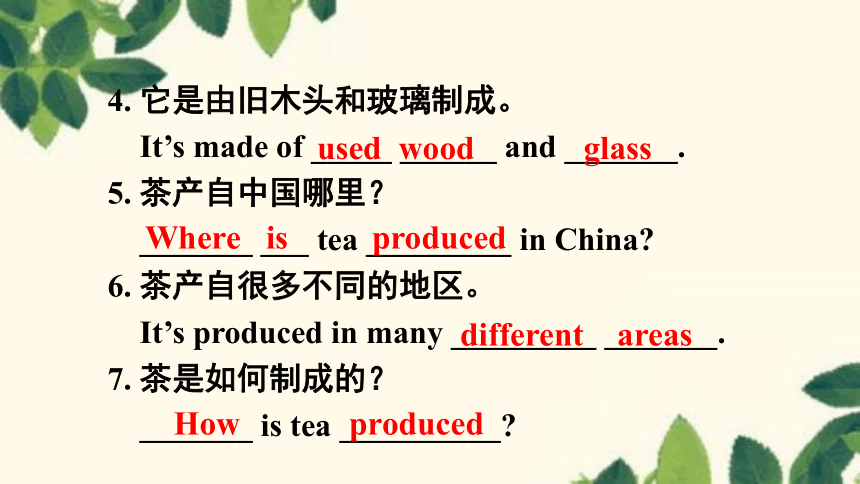
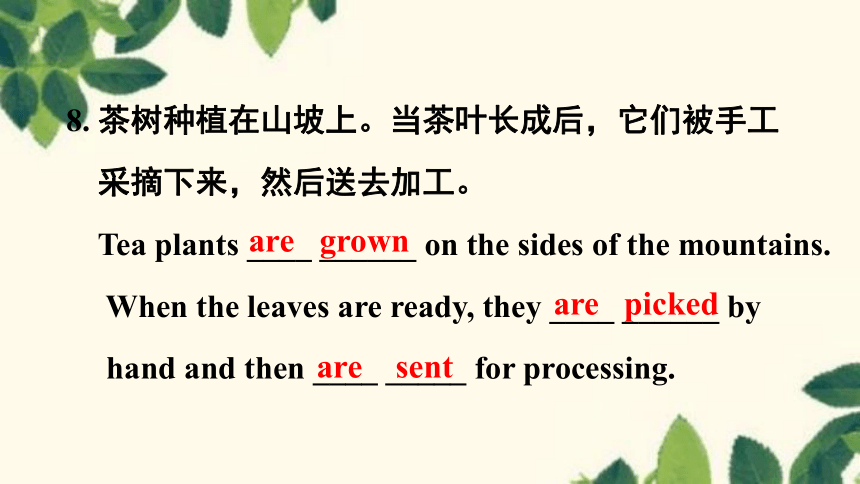
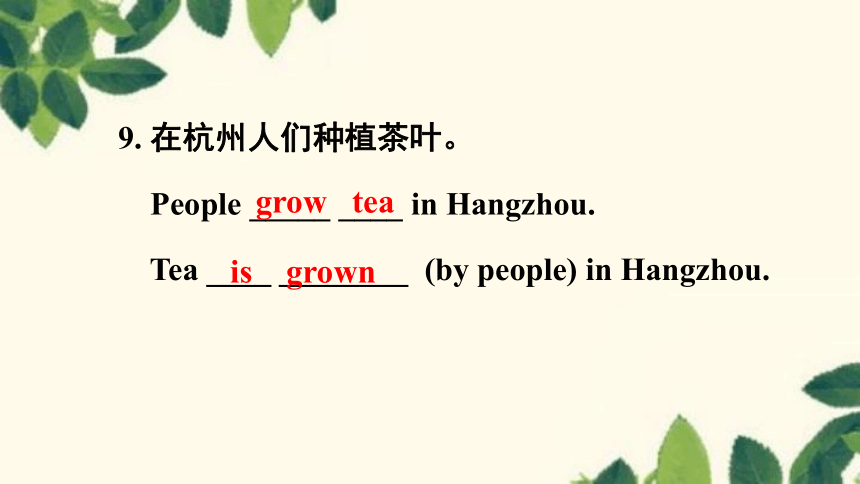
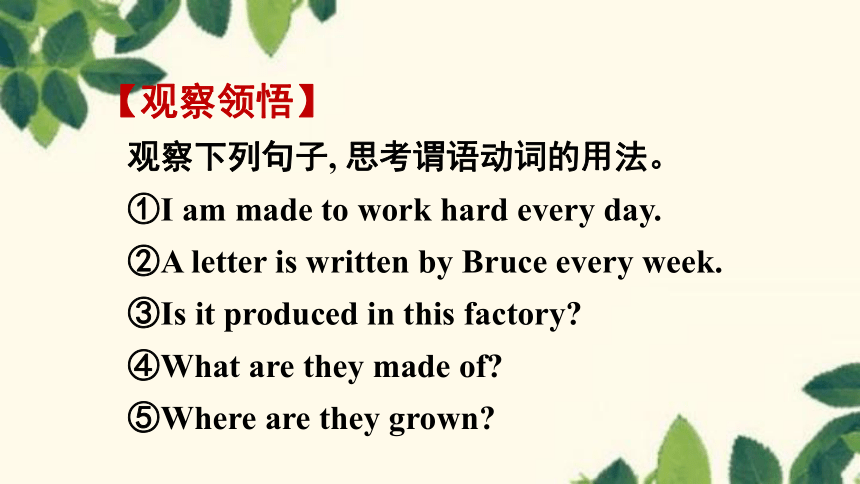
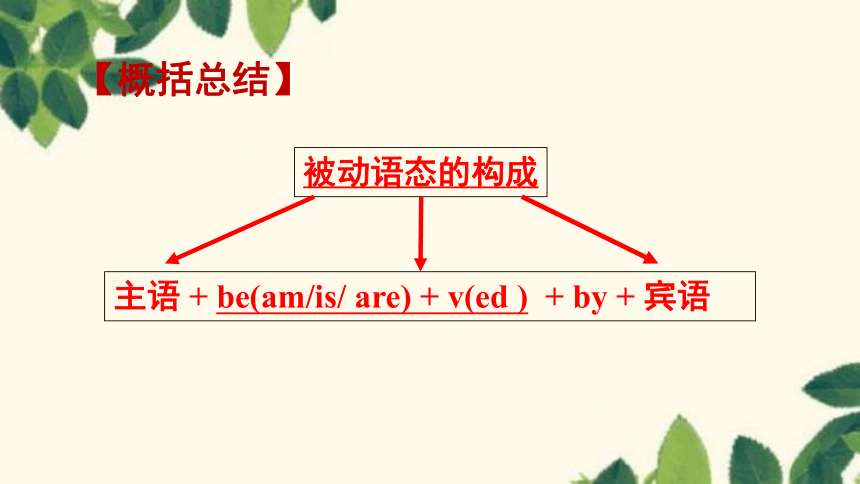
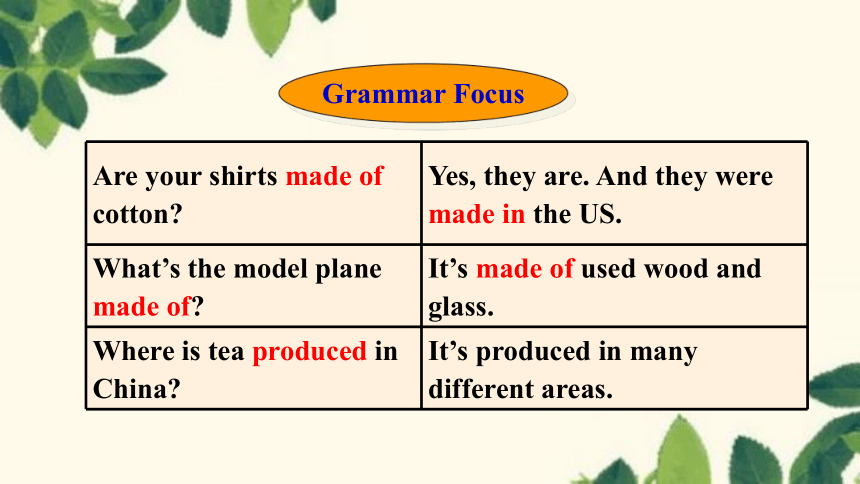
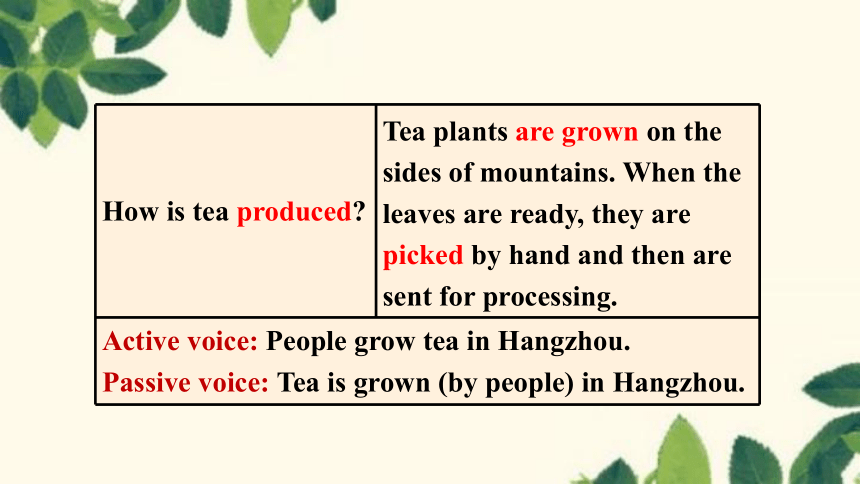
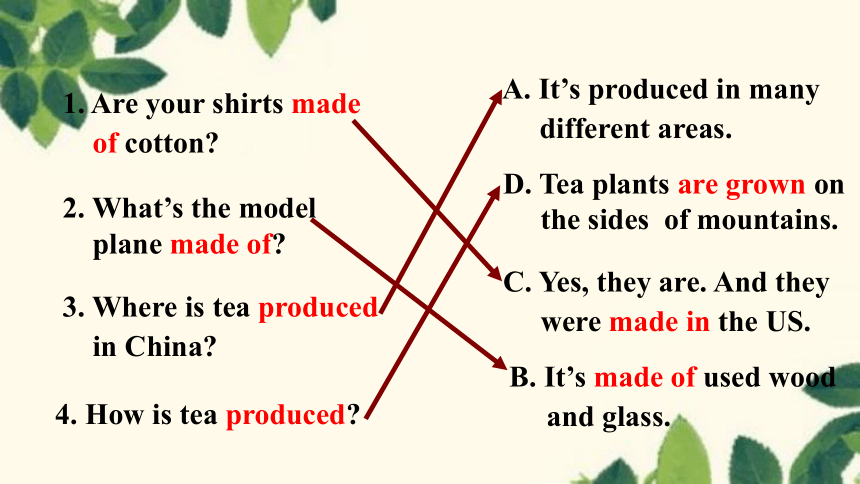

文档简介
(共61张PPT)
Section A Grammar Focus-4c
To understand passive voice (present tense)
To learn to use passive voice (present tense)
To practice using passive voice (present tense)
Objectives
1. 你的外套是棉的吗?
______ your coats _______ ___ cotton
2. 我的自行车产于美国。
My bikes are ______ ____ the US.
3. 飞机模型是由什么制成?
______ the model plane ______ of
made in
Are made of
What’s made
Practice the sentences
4. 它是由旧木头和玻璃制成。
It’s made of _____ ______ and _______.
5. 茶产自中国哪里?
_______ ___ tea _________ in China
6. 茶产自很多不同的地区。
It’s produced in many _________ _______.
7. 茶是如何制成的?
_______ is tea __________
Where is produced
different areas
used wood glass
How produced
8. 茶树种植在山坡上。当茶叶长成后,它们被手工
采摘下来,然后送去加工。
Tea plants ____ ______ on the sides of the mountains.
When the leaves are ready, they ____ ______ by
hand and then ____ _____ for processing.
are grown
are picked
are sent
9. 在杭州人们种植茶叶。
People _____ ____ in Hangzhou.
Tea ____ ________ (by people) in Hangzhou.
grow tea
is grown
【观察领悟】
观察下列句子, 思考谓语动词的用法。
①I am made to work hard every day.
②A letter is written by Bruce every week.
③Is it produced in this factory
④What are they made of
⑤Where are they grown
被动语态的构成
主语 + be(am/is/ are) + v(ed ) + by + 宾语
【概括总结】
Are your shirts made of cotton Yes, they are. And they were made in the US.
What’s the model plane made of It’s made of used wood and glass.
Where is tea produced in China It’s produced in many different areas.
Grammar Focus
How is tea produced Tea plants are grown on the sides of mountains. When the leaves are ready, they are picked by hand and then are sent for processing.
Active voice: People grow tea in Hangzhou.
Passive voice: Tea is grown (by people) in Hangzhou.
1. Are your shirts made
of cotton
C. Yes, they are. And they
were made in the US.
2. What’s the model
plane made of
B. It’s made of used wood
and glass.
3. Where is tea produced
in China
A. It’s produced in many
different areas.
4. How is tea produced
D. Tea plants are grown on
the sides of mountains.
在英语中,动词有两种语态,即主动语态和被动语态。被动语态的基本结构是“助动词 be + 及物动词的过去分词”,其中助动词be有人称、数和时态的变化,其变化规则与be作为连系动 完全一样。
一般现在时的被动语态
肯定式 否定式 疑问式
一般
现在时 I am asked …
He / She is asked …
We/You/They
are asked … I am not asked…
He / She is not asked…
We/You/They
are not asked … Am I asked …
Is he/she asked …
Are we/you /they asked …
一般现在时被动语态的基本用法
用法 示例
表示经常性或习惯性发生的被动动作 I am often asked the question by my pupils.
表示近期正在发生的被动动作 These days people are moved by a teacher named Zhang Lili.
描述某种常态化的被动的客观事实 The spaceship is mainly controlled by computer.
强调目前存在的针对行为主体人的被 限制性动作 You aren’t allowed to take photos.
主动语态变为被动语态的方法
第一步:将主动语态的宾语改为被动语态的主语;
第二步:将主动语态的谓语改为“be+及物动词的过
去分词“结构;
第三步:将主动语态的主语改为介词by的宾语,放在
谓语之后(有时可省略)。
如图示:
主动语态变为被动语态的方法
They (主语)grow (谓语)tea (宾语)in the south-east of China.
被动语态:
主动语态:
Tea (主语)is grown (谓语)by them in the south-east of China.
People play football all over the world.
2. The old man on TV tells a story on Sunday.
3. Students listen to the kind teacher carefully.
Football is played all over the world by people.
A story is told by the old man on TV on Sunday.
The kind teacher is listened to by students carefully.
把下列的主动句变为被动句。
4a Complete the sentences with the correct forms
of the verbs in brackets.
Children under 18 ______________ (not allow)
to watch this show without their parents.
2. We ________ (pay) by the boss on the last
Friday of each month.
3. A: What language ________ (speak) in Germany
B: Most people speak German, but many can
speak English, too.
are not allowed
are paid
is spoken
4. Most of the earth’s surface ___________
(cover) by water.
5. The classroom ___________ (clean) by
the students every day.
is covered
is cleaned
4b Rewrite the sentences using the passive voice.
Farmers plant the tea on the sides of mountains.
The tea is planted on the sides of mountains by farmers.
2. This shop uses the best materials to make dresses.
______________________________________
The best materials are used to make dresses by this shop.
3. Careless driving causes many traffic
accidents.
_____________________________________
_________________________
4. The postman brings letters and postcards
to people’s homes.
_____________________________________
___________________________
Letters and postcards are brought to people’s home by the postman.
Many traffic accidents are caused by careless driving.
5. Our family does not use this silver plate
very often.
_________________________________
___________________________
This silver plate is not used very often by our family.
4c Ask five classmates about something they are
wearing or have in their schoolbags. The list
of words below may help you.
pencil, jacket, sweater, T-shirt, shoes,
cap, gloves, ring...
A: What’s your pencil made of
B: It’s made of wood.
A: Where was it made
B: It was made in Shanghai.
What’s your pencil made of
It’s made of wood.
Where was it made
It was made in Shanghai.
Practice
What’s your cap made of
It’s made of cotton.
Where was it made
It was made in Beijing.
帽子
What are your gloves made of
They are made of wool.
Where were they made
They were made in Xinjiang.
手套
What’s your ring made of
It’s made of silver.
Where was it made
It was made in Hongkong.
Language Points
What language is spoken in Germany
在德国人们说什么语言?
Germany名词,意为“德国”,是国家名称。 German是其形容词形式,意为“德国的”;还可作名词,意为“德语;德国人”。
The weather in Germany is quite different.
德国的天气截然不同。
A German speaks German. 德国人说德语。
词尾为-man表示某国人的单词的复数形式一般
是-man变为-men。
an Englishman —— two Englishmen
a Frenchman —— two Frenchmen
但是, German “德国人”的复数形式则是直接加-s。
a German —— two Germans
2. Most of the earth’s surface is covered by water.
地球表面的大部分被水覆盖。
surface (the outside or top part of something)
名词,意为“表面;表层”。
The bowl has a shiny surface. 这个碗表面光亮。
surface (the outer appearance of person, thing
or situation.) 作名词,还可表示“外表;外观”。
Her gentleness is only on the surface.
她只是外表温和而已。
3. Careless driving causes many traffic accidents.
粗心驾驶导致很多交通事故。
traffic名词,意为“交通;路上行驶的车辆”,指的是路上来往的车辆和行人,是不可数名词。
There is heavy traffic during the rush hours.
上下班时间交通很拥挤。
There is little traffic on this road.
这条路上行驶的车辆很少。
It is said that two ______ and three _____ are going to visit our school next week.
A. German; Japanese B. Germany; Japan
C. Germanys; Japans D. Germans; Japanese
2. Driving after drinking wine ______ in China.
A. allows B. doesn’t allow
C. is allowed D. isn’t allowed
D
D
Ⅰ. 单项选择。
Exercises
3. — Excuse me, haven’t you learned the new _____
law Everyone in a car must wear the seat belt.
— Sorry, we won’t do that again.
A. food B. traffic
C. medicine D. education
4. If more trees ____, our city will be more
and more beautiful.
A. plant B. planted
C. are planted D. were planted
B
C
Ⅱ. 用正确的形式填空。
1. English___________ (use)as a foreign language in
our country.
2. Flowers _____________(grow) in the park.
3. He ______________ (not allow)to go out with his
friends on weekends.
4. When _____ they ________ (invite) to come here
is used
are grown
isn’t allowed
are
invited
Ⅲ. 句型转换。
I wash dishes every day. (改为被动语态)
______ ____ _______ ___ ____ every day.
2. Most of the farm work is done by machine in China today.(改为一般疑问句)
___ _____ ___ ___ _____ _____ ____ ___
________ in China today
3. The jacket is made of cotton. (改为否定句)
The jacket _____ ______ ____ cotton.
Dishes are washed by me
Is most of the farm work done by machine
isn’t made of
4. French and English are spoken in Canada.
(对画线部分提问)
______ _________ ____ _______ in Canada
5. He takes good care of the child.(改为被动语态)
____________________________________
What language are spoken
The child is taken good care of by him.
The environment in my hometown is improving because many trees every year.
A. plant B. planted C. are planted
C
中考链接
每年有许多树被种植,要用一般现在时的被动语态。
— I enjoy walking on the clean streets in the
morning.
— You know they ______ by the hard-working
cleaners every day.
A. clean B. are cleaned
C. are cleaning D. will clean
B
每天被勤劳的清洁工人打扫,
要用一般现在时的被动语态。
Homework
Master what you have learned in
this lesson.
Preview the next lesson.
To listen to 1c and 1d, then complete them.
To learn new words: pronounce, increase, speed, partner…
Objectives
Do you have difficulties in learning English
What things are difficult for you
Discussion
What’s your problem in learning English How do you solve them
I have difficulties in
learning English.
Can you help me
The difficulties he has in learning English.
New words: can’t pronounce some of the words
spell some English words
Speaking: be afraid to speak
Listening: can’t understand spoken English
Writing: can’t make complete sentences
Reading: read very slowly
Grammar: make mistakes
1a Learning English can be difficult. What things are
difficult for you Read the list. Check ( ) the
statements that are true for you.
____ I can’t pronounce some of the words.(v. 发音)
____ I can’t always understand spoken English.
____ I don’t know how to increase my reading speed.
____ I can’t spell some English words.
____ I often make mistakes in grammar.
(v. 增加;增长)
(n. 速度)
1b What other things are difficult for you
Make a list.
1. I don’t know enough words to write well.
2. ________________________________
3. ________________________________
4. ______________________________
5. ________________________________
can’t get the pronunciation right
be afraid people might laugh at me
forget a lot of new words
don’t get much writing practice
1c Paul finds it difficult to learn English. Listen and
complete the learning challenges he talks about.
1. He can’t get the__________________ right.
2. He___________ a lot of new words.
3. He can’t always_____________ when people talk to him.
4. He doesn’t get much___________ practice.
pronunciation
forgets
understand
writing
Challenges
1d Listen again. Complete the solutions.
1. ________________ can help.
He can always_____________________ in his notebook and study them at home.
He can_____________________________ to practice speaking.
He should find a _______ to practice writing.
Listening
write the new words
join an English language club
pen pal
Solutions
1e Role-play conversations using the information
in 1c and 1d.
① A: I don’t have a partner to practice English with.
B: Maybe you should join an English club.
② A: I always forget the new words.
B: You can write the new words in your notebook
and study them at home.
A: I can’t always understand when people talk to me.
B: Maybe you should join an English language club
to practice speaking.
A: I forget a lot of new words.
B: Maybe you should write the new words in your
notebook and study them at home.
Pair work
1.I often make mistakes in grammar.
mistake n. 错误;过失 make mistakes 犯错
Tom didn’t make a single spelling mistake in his composition. 汤姆在这篇作文里一个字也没拼错。
mistake vt. 弄错,误解
I mistook the number and went to the wrong room. 我记错号码, 走错了房间。
Language points
2. challenge n. 挑战
He wants a career that offers a challenge. 他想要一份有挑战性的事业。
vt. 向……挑战;对……提出异议
I challenged him to show his proof. 我要他拿出证据。
He challenged my view on that matter. 他就我对那件事的看法提出异议。
3. solution n. (问题、疑难等的) 解决;解答
It may take a long time to find a solution to the problem. 也许要花很长时间才能找到解决这个问题的办法。 The solution of the problem requires a lot of time. 解决这个问题需要很多时间。
4. Maybe you should join an English club.
join/join in/take part in
(1) join=be a member of 参加, 指加入某种组织,并成为其中的一员。
join the army / party 入伍/党 join the club 加入俱乐部
join in 后接活动名称
join sb. 加入到某个人群之中
Ⅰ. 用所给词的适当形式填空。
1. Sometimes, I can’t get the____________ (pronounce) right.
2. I don’t know how__________ (improve) my spoken English.
3. The more careful you are, the fewer_________ (mistake)
you’ll make.
4. You can find a pen pal to practice________ (write).
5. She can’t______ (spell) English words.
Exercises
pronunciation
to improve
mistakes
writing
spell
Ⅱ. 用方框中所给单词的适当形式填空。
We must learn to face the __________ in our life.
2. He has trouble in understanding _______ English.
3. Can you think of a good _______ to the problem
4. You can listen to the tapes to get much listening _______.
5. The more careful you are, the fewer _______ you’ll make.
solution, practice, mistake, spoken, challenges
challenges
spoken
solution
practice
mistakes
— Excuse me, can you teach me how to ______
this new word
— No problem. Look at my mouth and listen
carefully.
A. prove B. pronounce
C. prepare D. produce
B
中考链接
证明
准备
发音
生产
你能教给我这个新词怎么样……
— Miss Huang always advises us to practice
speaking English after class.
— She is right. Speaking is an important
language __________.
A. sign B. skill C. suggestion
符号
技能
建议
B
Review the new words and expressions you’ve learned today.
Preview the article How Can You Become a Successful Learner on page 6.
Homework
Section A Grammar Focus-4c
To understand passive voice (present tense)
To learn to use passive voice (present tense)
To practice using passive voice (present tense)
Objectives
1. 你的外套是棉的吗?
______ your coats _______ ___ cotton
2. 我的自行车产于美国。
My bikes are ______ ____ the US.
3. 飞机模型是由什么制成?
______ the model plane ______ of
made in
Are made of
What’s made
Practice the sentences
4. 它是由旧木头和玻璃制成。
It’s made of _____ ______ and _______.
5. 茶产自中国哪里?
_______ ___ tea _________ in China
6. 茶产自很多不同的地区。
It’s produced in many _________ _______.
7. 茶是如何制成的?
_______ is tea __________
Where is produced
different areas
used wood glass
How produced
8. 茶树种植在山坡上。当茶叶长成后,它们被手工
采摘下来,然后送去加工。
Tea plants ____ ______ on the sides of the mountains.
When the leaves are ready, they ____ ______ by
hand and then ____ _____ for processing.
are grown
are picked
are sent
9. 在杭州人们种植茶叶。
People _____ ____ in Hangzhou.
Tea ____ ________ (by people) in Hangzhou.
grow tea
is grown
【观察领悟】
观察下列句子, 思考谓语动词的用法。
①I am made to work hard every day.
②A letter is written by Bruce every week.
③Is it produced in this factory
④What are they made of
⑤Where are they grown
被动语态的构成
主语 + be(am/is/ are) + v(ed ) + by + 宾语
【概括总结】
Are your shirts made of cotton Yes, they are. And they were made in the US.
What’s the model plane made of It’s made of used wood and glass.
Where is tea produced in China It’s produced in many different areas.
Grammar Focus
How is tea produced Tea plants are grown on the sides of mountains. When the leaves are ready, they are picked by hand and then are sent for processing.
Active voice: People grow tea in Hangzhou.
Passive voice: Tea is grown (by people) in Hangzhou.
1. Are your shirts made
of cotton
C. Yes, they are. And they
were made in the US.
2. What’s the model
plane made of
B. It’s made of used wood
and glass.
3. Where is tea produced
in China
A. It’s produced in many
different areas.
4. How is tea produced
D. Tea plants are grown on
the sides of mountains.
在英语中,动词有两种语态,即主动语态和被动语态。被动语态的基本结构是“助动词 be + 及物动词的过去分词”,其中助动词be有人称、数和时态的变化,其变化规则与be作为连系动 完全一样。
一般现在时的被动语态
肯定式 否定式 疑问式
一般
现在时 I am asked …
He / She is asked …
We/You/They
are asked … I am not asked…
He / She is not asked…
We/You/They
are not asked … Am I asked …
Is he/she asked …
Are we/you /they asked …
一般现在时被动语态的基本用法
用法 示例
表示经常性或习惯性发生的被动动作 I am often asked the question by my pupils.
表示近期正在发生的被动动作 These days people are moved by a teacher named Zhang Lili.
描述某种常态化的被动的客观事实 The spaceship is mainly controlled by computer.
强调目前存在的针对行为主体人的被 限制性动作 You aren’t allowed to take photos.
主动语态变为被动语态的方法
第一步:将主动语态的宾语改为被动语态的主语;
第二步:将主动语态的谓语改为“be+及物动词的过
去分词“结构;
第三步:将主动语态的主语改为介词by的宾语,放在
谓语之后(有时可省略)。
如图示:
主动语态变为被动语态的方法
They (主语)grow (谓语)tea (宾语)in the south-east of China.
被动语态:
主动语态:
Tea (主语)is grown (谓语)by them in the south-east of China.
People play football all over the world.
2. The old man on TV tells a story on Sunday.
3. Students listen to the kind teacher carefully.
Football is played all over the world by people.
A story is told by the old man on TV on Sunday.
The kind teacher is listened to by students carefully.
把下列的主动句变为被动句。
4a Complete the sentences with the correct forms
of the verbs in brackets.
Children under 18 ______________ (not allow)
to watch this show without their parents.
2. We ________ (pay) by the boss on the last
Friday of each month.
3. A: What language ________ (speak) in Germany
B: Most people speak German, but many can
speak English, too.
are not allowed
are paid
is spoken
4. Most of the earth’s surface ___________
(cover) by water.
5. The classroom ___________ (clean) by
the students every day.
is covered
is cleaned
4b Rewrite the sentences using the passive voice.
Farmers plant the tea on the sides of mountains.
The tea is planted on the sides of mountains by farmers.
2. This shop uses the best materials to make dresses.
______________________________________
The best materials are used to make dresses by this shop.
3. Careless driving causes many traffic
accidents.
_____________________________________
_________________________
4. The postman brings letters and postcards
to people’s homes.
_____________________________________
___________________________
Letters and postcards are brought to people’s home by the postman.
Many traffic accidents are caused by careless driving.
5. Our family does not use this silver plate
very often.
_________________________________
___________________________
This silver plate is not used very often by our family.
4c Ask five classmates about something they are
wearing or have in their schoolbags. The list
of words below may help you.
pencil, jacket, sweater, T-shirt, shoes,
cap, gloves, ring...
A: What’s your pencil made of
B: It’s made of wood.
A: Where was it made
B: It was made in Shanghai.
What’s your pencil made of
It’s made of wood.
Where was it made
It was made in Shanghai.
Practice
What’s your cap made of
It’s made of cotton.
Where was it made
It was made in Beijing.
帽子
What are your gloves made of
They are made of wool.
Where were they made
They were made in Xinjiang.
手套
What’s your ring made of
It’s made of silver.
Where was it made
It was made in Hongkong.
Language Points
What language is spoken in Germany
在德国人们说什么语言?
Germany名词,意为“德国”,是国家名称。 German是其形容词形式,意为“德国的”;还可作名词,意为“德语;德国人”。
The weather in Germany is quite different.
德国的天气截然不同。
A German speaks German. 德国人说德语。
词尾为-man表示某国人的单词的复数形式一般
是-man变为-men。
an Englishman —— two Englishmen
a Frenchman —— two Frenchmen
但是, German “德国人”的复数形式则是直接加-s。
a German —— two Germans
2. Most of the earth’s surface is covered by water.
地球表面的大部分被水覆盖。
surface (the outside or top part of something)
名词,意为“表面;表层”。
The bowl has a shiny surface. 这个碗表面光亮。
surface (the outer appearance of person, thing
or situation.) 作名词,还可表示“外表;外观”。
Her gentleness is only on the surface.
她只是外表温和而已。
3. Careless driving causes many traffic accidents.
粗心驾驶导致很多交通事故。
traffic名词,意为“交通;路上行驶的车辆”,指的是路上来往的车辆和行人,是不可数名词。
There is heavy traffic during the rush hours.
上下班时间交通很拥挤。
There is little traffic on this road.
这条路上行驶的车辆很少。
It is said that two ______ and three _____ are going to visit our school next week.
A. German; Japanese B. Germany; Japan
C. Germanys; Japans D. Germans; Japanese
2. Driving after drinking wine ______ in China.
A. allows B. doesn’t allow
C. is allowed D. isn’t allowed
D
D
Ⅰ. 单项选择。
Exercises
3. — Excuse me, haven’t you learned the new _____
law Everyone in a car must wear the seat belt.
— Sorry, we won’t do that again.
A. food B. traffic
C. medicine D. education
4. If more trees ____, our city will be more
and more beautiful.
A. plant B. planted
C. are planted D. were planted
B
C
Ⅱ. 用正确的形式填空。
1. English___________ (use)as a foreign language in
our country.
2. Flowers _____________(grow) in the park.
3. He ______________ (not allow)to go out with his
friends on weekends.
4. When _____ they ________ (invite) to come here
is used
are grown
isn’t allowed
are
invited
Ⅲ. 句型转换。
I wash dishes every day. (改为被动语态)
______ ____ _______ ___ ____ every day.
2. Most of the farm work is done by machine in China today.(改为一般疑问句)
___ _____ ___ ___ _____ _____ ____ ___
________ in China today
3. The jacket is made of cotton. (改为否定句)
The jacket _____ ______ ____ cotton.
Dishes are washed by me
Is most of the farm work done by machine
isn’t made of
4. French and English are spoken in Canada.
(对画线部分提问)
______ _________ ____ _______ in Canada
5. He takes good care of the child.(改为被动语态)
____________________________________
What language are spoken
The child is taken good care of by him.
The environment in my hometown is improving because many trees every year.
A. plant B. planted C. are planted
C
中考链接
每年有许多树被种植,要用一般现在时的被动语态。
— I enjoy walking on the clean streets in the
morning.
— You know they ______ by the hard-working
cleaners every day.
A. clean B. are cleaned
C. are cleaning D. will clean
B
每天被勤劳的清洁工人打扫,
要用一般现在时的被动语态。
Homework
Master what you have learned in
this lesson.
Preview the next lesson.
To listen to 1c and 1d, then complete them.
To learn new words: pronounce, increase, speed, partner…
Objectives
Do you have difficulties in learning English
What things are difficult for you
Discussion
What’s your problem in learning English How do you solve them
I have difficulties in
learning English.
Can you help me
The difficulties he has in learning English.
New words: can’t pronounce some of the words
spell some English words
Speaking: be afraid to speak
Listening: can’t understand spoken English
Writing: can’t make complete sentences
Reading: read very slowly
Grammar: make mistakes
1a Learning English can be difficult. What things are
difficult for you Read the list. Check ( ) the
statements that are true for you.
____ I can’t pronounce some of the words.(v. 发音)
____ I can’t always understand spoken English.
____ I don’t know how to increase my reading speed.
____ I can’t spell some English words.
____ I often make mistakes in grammar.
(v. 增加;增长)
(n. 速度)
1b What other things are difficult for you
Make a list.
1. I don’t know enough words to write well.
2. ________________________________
3. ________________________________
4. ______________________________
5. ________________________________
can’t get the pronunciation right
be afraid people might laugh at me
forget a lot of new words
don’t get much writing practice
1c Paul finds it difficult to learn English. Listen and
complete the learning challenges he talks about.
1. He can’t get the__________________ right.
2. He___________ a lot of new words.
3. He can’t always_____________ when people talk to him.
4. He doesn’t get much___________ practice.
pronunciation
forgets
understand
writing
Challenges
1d Listen again. Complete the solutions.
1. ________________ can help.
He can always_____________________ in his notebook and study them at home.
He can_____________________________ to practice speaking.
He should find a _______ to practice writing.
Listening
write the new words
join an English language club
pen pal
Solutions
1e Role-play conversations using the information
in 1c and 1d.
① A: I don’t have a partner to practice English with.
B: Maybe you should join an English club.
② A: I always forget the new words.
B: You can write the new words in your notebook
and study them at home.
A: I can’t always understand when people talk to me.
B: Maybe you should join an English language club
to practice speaking.
A: I forget a lot of new words.
B: Maybe you should write the new words in your
notebook and study them at home.
Pair work
1.I often make mistakes in grammar.
mistake n. 错误;过失 make mistakes 犯错
Tom didn’t make a single spelling mistake in his composition. 汤姆在这篇作文里一个字也没拼错。
mistake vt. 弄错,误解
I mistook the number and went to the wrong room. 我记错号码, 走错了房间。
Language points
2. challenge n. 挑战
He wants a career that offers a challenge. 他想要一份有挑战性的事业。
vt. 向……挑战;对……提出异议
I challenged him to show his proof. 我要他拿出证据。
He challenged my view on that matter. 他就我对那件事的看法提出异议。
3. solution n. (问题、疑难等的) 解决;解答
It may take a long time to find a solution to the problem. 也许要花很长时间才能找到解决这个问题的办法。 The solution of the problem requires a lot of time. 解决这个问题需要很多时间。
4. Maybe you should join an English club.
join/join in/take part in
(1) join=be a member of 参加, 指加入某种组织,并成为其中的一员。
join the army / party 入伍/党 join the club 加入俱乐部
join in 后接活动名称
join sb. 加入到某个人群之中
Ⅰ. 用所给词的适当形式填空。
1. Sometimes, I can’t get the____________ (pronounce) right.
2. I don’t know how__________ (improve) my spoken English.
3. The more careful you are, the fewer_________ (mistake)
you’ll make.
4. You can find a pen pal to practice________ (write).
5. She can’t______ (spell) English words.
Exercises
pronunciation
to improve
mistakes
writing
spell
Ⅱ. 用方框中所给单词的适当形式填空。
We must learn to face the __________ in our life.
2. He has trouble in understanding _______ English.
3. Can you think of a good _______ to the problem
4. You can listen to the tapes to get much listening _______.
5. The more careful you are, the fewer _______ you’ll make.
solution, practice, mistake, spoken, challenges
challenges
spoken
solution
practice
mistakes
— Excuse me, can you teach me how to ______
this new word
— No problem. Look at my mouth and listen
carefully.
A. prove B. pronounce
C. prepare D. produce
B
中考链接
证明
准备
发音
生产
你能教给我这个新词怎么样……
— Miss Huang always advises us to practice
speaking English after class.
— She is right. Speaking is an important
language __________.
A. sign B. skill C. suggestion
符号
技能
建议
B
Review the new words and expressions you’ve learned today.
Preview the article How Can You Become a Successful Learner on page 6.
Homework
同课章节目录
- Unit 1 How can we become good learners.
- Section A
- Section B
- Unit 2 I think that mooncakes are delicious!
- Section A
- Section B
- Unit 3 Could you please tell me where the restroom
- Section A
- Section B
- Unit 4 I used to be afraid of the dark.
- Section A
- Section B
- Unit 5 What are the shirts made of?
- Section A
- Section B
- Review of Units 1-5
- Unit 6 When was it invented?
- Section A
- Section B
- Unit 7 Teenagers should be allowed to choose their
- Section A
- Section B
- Unit 8 It must belong to Carla.
- Section A
- Section B
- Unit 9 I like music that I can dance to.
- Section A
- Section B
- Unit 10 You're supposed to shake hands.
- Section A
- Section B
- Review of Units 6-10
- Unit 11 Sad movies make me cry.
- Section A
- Section B
- Unit 12 Life is full of the unexpected
- Section A
- Section B
- Unit 13 We're trying to save the earth!
- Section A
- Section B
- Unit 14 I remember meeting all of you in Grade 7.
- Section A
- Section B
- Review of Units 11-14
